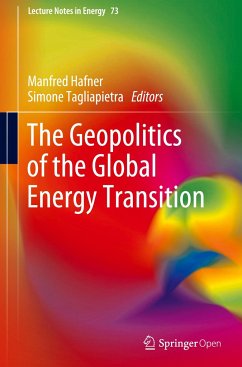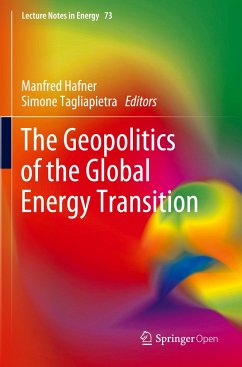
Global Energy Transition and Sustainable Development Challenges, Vol. 1
Models and Regions
Herausgegeben: Devezas, Tessaleno; Leitão, João; Sarygulov, Askar; LePoire, David J.; Khusainov, Bulat

PAYBACK Punkte
49 °P sammeln!
This two-volume book presents the challenges of the global energy transition, offering a comprehensive exploration of the policies and drivers shaping the pace and trajectory of this transformation. Highlighting regional development, the book shows how different models and scenarios of energy transition emerge. It discusses important factors, such as materials and technologies, shedding light on the opportunities and constraints for the energy transition.Global warming and climate change influenced the change in people's consciousness and their awareness of the need for more limited use of hyd...
This two-volume book presents the challenges of the global energy transition, offering a comprehensive exploration of the policies and drivers shaping the pace and trajectory of this transformation. Highlighting regional development, the book shows how different models and scenarios of energy transition emerge. It discusses important factors, such as materials and technologies, shedding light on the opportunities and constraints for the energy transition.
Global warming and climate change influenced the change in people's consciousness and their awareness of the need for more limited use of hydrocarbon resources. Changes in weather conditions, rising sea levels, and destructive climate events such as hurricanes, forest fires, droughts, floods, etc. have become more frequent. Many countries around the world, reacting to these changes, have developed long-term plans to actively replace fossil fuels - gas, oil, and coal with renewable energy sources, mainly solar and wind. However, the low replacement rates observed in the global energy sector over the past 30 years raise the question of how far the decarbonization scenarios and models being implemented by many countries bring us closer to the ultimate goal of creating an economy with a low carbon footprint.
Seeking answers, the volumes feature 22 chapters split across the two books, which in detail discuss various aspects of the energy transition and their impact on the sustainability of economic development and the future of energy. This first volume, "Models and Regions," focuses on regional disparities and economic drivers, presenting case studies from different regions in 10 chapters.
Global warming and climate change influenced the change in people's consciousness and their awareness of the need for more limited use of hydrocarbon resources. Changes in weather conditions, rising sea levels, and destructive climate events such as hurricanes, forest fires, droughts, floods, etc. have become more frequent. Many countries around the world, reacting to these changes, have developed long-term plans to actively replace fossil fuels - gas, oil, and coal with renewable energy sources, mainly solar and wind. However, the low replacement rates observed in the global energy sector over the past 30 years raise the question of how far the decarbonization scenarios and models being implemented by many countries bring us closer to the ultimate goal of creating an economy with a low carbon footprint.
Seeking answers, the volumes feature 22 chapters split across the two books, which in detail discuss various aspects of the energy transition and their impact on the sustainability of economic development and the future of energy. This first volume, "Models and Regions," focuses on regional disparities and economic drivers, presenting case studies from different regions in 10 chapters.












